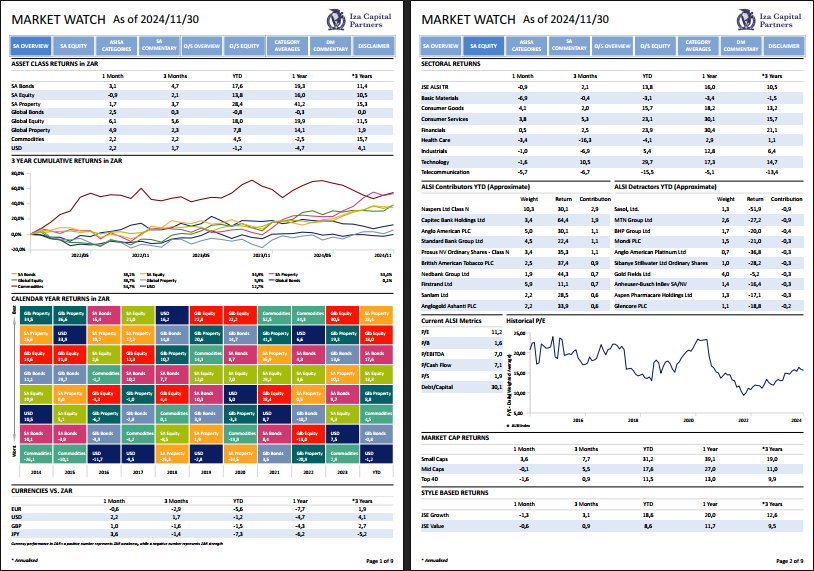Click the image to read the PDF
Click the button to download the PDF
Offshore Commentary
Market Overview:
November was marked by significant market movements driven by Donald Trump’s re-election as U.S. President and the Republican party’s control of Congress. Expectations of pro-growth policies, including tax cuts, deregulation, and fiscal expansion, boosted U.S. equities and strengthened the U.S. dollar. Domestically focused small-cap stocks performed exceptionally well, while emerging markets faced headwinds from trade tariff concerns and dollar strength.
Equities:
U.S. equities delivered strong gains, rising 6% during the month. Small caps surged 11%, supported by optimism around domestic growth prospects under the new administration. The consumer discretionary and financials sectors were the top performers, with banks, carmakers, and retailers leading the charge. Healthcare and materials sectors lagged, weighed down by concerns over regulatory pressures. Macroeconomic data further bolstered sentiment, with October retail sales rising 0.4% and the November Flash PMI reaching 55.3, indicating robust activity.
Eurozone equities were flat for the month, reflecting mixed sector performance and weak economic data. Inflation climbed to 2.3% in November, driven by energy and food prices, while manufacturing and services PMIs remained in contractionary territory. Political instability in Germany following the collapse of its coalition government added uncertainty, while French borrowing costs rose amid fiscal concerns.
UK equities recovered some losses, aided by a slight decline in long-term borrowing costs. Domestically focused stocks benefited from improved sentiment following the October Budget, although services activity slowed to a one-year low. Inflation increased to 2.3%, while takeover activity picked up toward the end of the month, signaling renewed investor interest.
Japanese equities ended slightly negative, with the TOPIX index down 0.5%. Large-cap exporters underperformed amid fears of U.S. tariffs and trade restrictions. In contrast, domestically oriented sectors, supported by yen strength and robust demand, provided some resilience. Corporate governance reforms continued to make progress, with companies announcing additional share buybacks receiving favorable market reactions.
Emerging markets underperformed developed markets, with the MSCI EM Index declining in USD terms. Trade policy fears and a strengthening dollar weighed heavily on China, Korea, and Brazil. Smaller emerging markets such as the Philippines and Indonesia experienced significant foreign outilows. India, Kuwait, and the UAE were relative outperformers, benefiting from regional stability and reduced trade dependencies.
Fixed Income:
Global bond markets experienced mixed performance, driven by inflationary concerns and revised expectations for slower rate cuts. U.S. Treasuries ended the month with yields slightly lower at 4.17%, as markets reassessed the feasibility and timeline of Trump’s proposed fiscal policies. Eurozone bonds outperformed, with periphery markets rallying amid German political uncertainty and rising French debt concerns. UK Gilts saw a strong rally as the Bank of England cut rates to 4.75%, supported by strong investor demand.
Japanese government bonds declined, reflecting expectations of further rate hikes and yen strength. U.S. high-yield bonds outperformed, buoyed by optimism about pro-business policies and tight spreads. Convertible bonds benefited from the equity market’s tailwind, with the FTSE Global Focus Index (hedged in USD) advancing 3.6%.
Commodities and Digital Assets:
The S&P GSCI Index posted modest gains, with agriculture and livestock leading performance. Coffee and cocoa prices rose, while wheat and sugar declined. Natural gas prices climbed sharply due to supply constraints, while precious metals such as gold and silver fell amid profit-taking. The cryptocurrency market experienced significant growth, with Bitcoin surging 37% and Ethereum rising 47% to new all-time highs. Increased trading volumes reflected optimism around Trump’s promise to make the U.S. the “crypto capital of the world,” boosting innovation and institutional adoption in the sector.
Outlook:
Trump’s re-election has sparked optimism in U.S. markets, driven by fiscal stimulus and deregulation. However, potential trade tariffs and geopolitical tensions pose risks to global stability. U.S. equities’ elevated valuations (22x forward earnings compared to 13x in Europe and 12x in emerging markets) leave limited room for error, particularly as dollar strength pressures emerging markets.
Balanced portiolios are essential in navigating this environment. While U.S. assets may continue to outperform in the short term, opportunities in undervalued regions like Europe and selective emerging markets remain atiractive. Fixed income strategies should prioritize credit quality and duration management, given ongoing inflationary pressures and central bank actions.
As Trump’s policies unfold, investors should prepare for heightened volatility and focus on quality and resilience to weather potential disruptions and capitalize on emerging opportunities.



